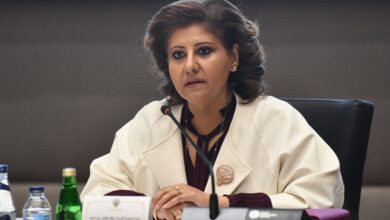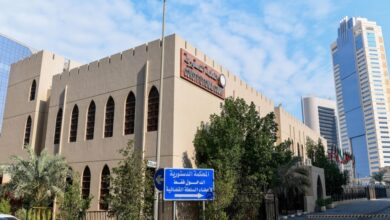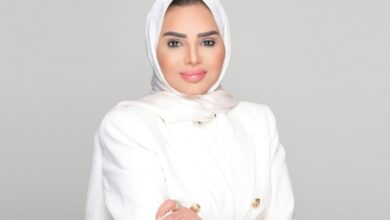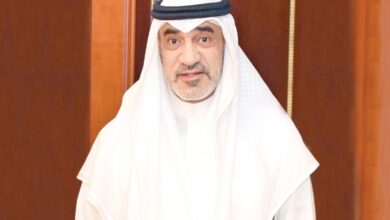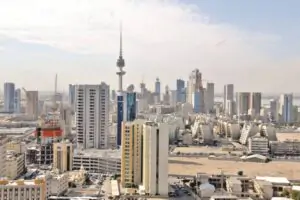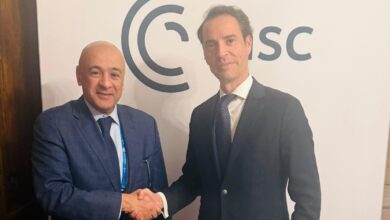US and GCC forge new economic partnership

By Tareq Yusef AlShumaimry
United States President Donald Trump ended his four-day eventful tour of the Middle East (ME) on Friday in the United Arab Emirates. Earlier in the week, on Tuesday, he arrived in Riyadh, Saudi Arabia before heading to the Qatari capital Doha on Wednesday. President Trump’s visit to the three Middle Eastern states that are part of the six-nation Gulf Cooperation Council (GCC), is considered significant, as it is the first overseas trip by the US President since taking office for a second term—excluding his visit to the Vatican for the funeral of Pope Francis in late April.
Tellingly, President Trump’s trip to the Middle East did not include a visit to America’s supposedly closest ally in the region, Israel, even though Israeli Prime Minister Benjamin Nethanyahu was the first world leader to visit the White House since inauguration of the second Trump presidency. Although some political observers read much into the exclusion of Israel, the fact is Trump’s first trip to the Middle East is less of a political visit, and largely geared towards signing lucrative trade deals with some of the richest nations in the world.
Underlining the economic aspect of Trump’s visit, his talks in Riyadh, Doha, and Abu Dhabi were centered on garnering investments into the US economy and promoting mega deals for US businesses. Politics, when it did feature during the trip, came largely from the president’s characteristic off-the-cuff remarks, including on Iran, Lebanon and Palestine. However, the US President did spring a political surprise by announcing that the US would remove sanctions on Syria, and then following up on this by meeting Syria’s new leader Ahmed al-Sharaa in Riyadh.
In the days ahead President Trump will no doubt trumpet that his visit to the Gulf countries led to trillions of dollars in investment and business deals that will foster development, manufacturing, and more jobs in the US economy. And, he would be right. Multi-billion dollar purchases in US defense armaments from the region, mega deals on hundreds of Boeing aircraft, engines and spare-parts by Saudi Arabia, Qatar, and the UAE, as well as plans for trillions of dollars in investment in the US economy were announced during the presidential visit.
However, the GCC states are likely to evaluate the success of Trump’s trip in terms of its tangible, as well as intangible benefits to the region. On a palpable note, during his visit, President Trump reiterated US commitment to the strategic partnership and defense of the region, waived restrictions on sale of advanced semiconductor chips to Saudi Arabia and the UAE. And, in a politically momentous decision, announced the lifting of sanctions against Syria.
On a more impalpable level, the GCC states will consider their trillion dollar investments and purchases from the US as economically prudent decisions, but also as a politically strategic move. During President Trump’s first term in office, it had become evident that the easiest way into the presidency’s good books was through trade deals and investments in the US economy. Political analysts see the mega deals and investments signed with GCC states, as a means for the region to gain an influential voice in the White House in matters related to the Middle East.
Following the decision to scrap the Biden-era ‘AI Diffusion Rule’—which prevented sale of advanced AI microchips to the Middle East and elsewhere, for fear it would be ‘leaked’ to adversarial states—President Trump is now considering selling advanced AI chips to the UAE. During his visit to Riyadh, President Trump also witnessed the signing of a commitment by Saudi state-owned AI company, Humain, to build AI infrastructure using advanced chips from US chip manufacturer, Nvidia.
The chip deals with Saudi Arabia and the UAE could indicate a shift in US policy on AI chips. By developing DeepSeek, an AI based large language model, China had already shown its capacity to overcome US chip restrictions. Apparently the US now believes that rather than attempting to deny China access to the latest chips, it would be more prudent to foster partnerships and garner investments into the AI industry in the US. This would allow the funding of research and development of more advanced chips that will enable the US to stay ahead of competition.
Before departing Riyadh and heading to Qatar, President Trump attended the Gulf-US Summit on 14 May, where he met with their majesties and leaders of the GCC states. The summit focused on reviewing regional and international developments, coordinating joint efforts to enhance security and stability of the region, promote sustainable development, and strengthen strategic partnership between the GCC and the US.
In his address to the summit, His Highness the Amir of Kuwait Sheikh Meshal Al-Ahmad Al-Jaber Al-Sabah emphasized the pivotal role of economic collaboration in the strategic partnership between the GCC and the United States. Stressing the importance of mutual cooperation, built on a shared vision for peace, stability and development, His Highness voiced his aspiration to expand bilateral projects and deepen economic ties with Washington.
Pointing out that the summit was being held amid critical global circumstances, marked by rising tensions, conflicts, and cross-border challenges, His Highness underlined the GCC’s unified stance in preserving the security and stability of the region, while rejecting any violations of their land, waters, and resources. He also recalled with appreciation the historic American leadership in the coalition that liberated Kuwait from Iraqi occupation in 1991, a memory, he said, which remains etched in the minds of the Kuwaiti people and the Gulf nations.
On the humanitarian front, the Amir reaffirmed Kuwait’s strong commitment to relief efforts in conflict and disaster-stricken areas. He called for coordinated US-Gulf development-aid to ensure an effective and sustainable response to the needs of affected communities.
Concluding his speech, His Highness proposed the establishment of a Gulf-American forum for educational and cultural dialogue, aimed at fostering scientific and joint research programs, empowering youth, and promoting values of tolerance, openness, and civic understanding.
The GCC states and the US have a long and cherished history of strong relations characterized by friendship, cooperation, shared values and institutional relationships. Anchored in history, the partnership between the GCC states and the US today hinges on shared strategic interests based on the dual axis of reciprocity and adaptability. At a time of evolving global geopolitical landscape, the robust and friendly relations between the GCC and the US is a testament to what the two sides can achieve in terms of stability, global peace and economic sustainability.
During his four-day whirlwind tour of the region that took him to Saudi Arabia, Qatar and the UAE, as well as his participation in the Gulf–US Summit in Riyadh, the US President had a hectic schedule that covered diplomacy, trade and security issues. While Trump the self-styled global peacemaker is still interested in reaching a political deal with Iran on its nuclear file, with Russia on the Ukrainian conflict, and transforming Gaza into a ‘MIddle East Riviera’, or as he said in Qatar, a ‘Freedom Zone’ these plans will for the moment still remain largely aspirational.
The bilateral trade between the United States and the Gulf Cooperation Council (GCC) countries reached $120 billion in 2024. This was highlighted during the recent GCC-U.S. Summit, where leaders emphasized the growing economic partnership between the two regions. The trade relationship spans various sectors, including energy, defense, technology, and infrastructure. If you’re interested in more details, you can check out the full report
However, Trump the passionate dealmaker has much to show from his highly successful tour of the Middle East. The president has raked in trillions of dollars of investments and business deals for the US economy, and is clearly delivering on his election promise to Make America Great Again (MAGA). Only this time, his promise of MAGA and to accelerate American development, employment, and prosperity is being catalyzed by investments and purchases from wealthy Middle East nations.
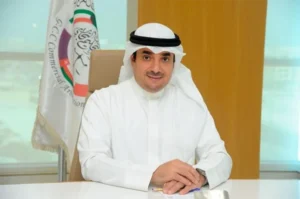
Tareq Yousef AlShumaimry, served as Chairman of the Finance Committee and Chairman of the General Budget Committee of the Permanent Court of Arbitration in The Hague (PCA) and an observer in the Administrative Council of the Court and the Consular at International Court of Justice (ICJ) and the Embassy of the State of Kuwait in the Netherlands during this period from 2013 to 2020. Email: tareq@alshumaimry.com







